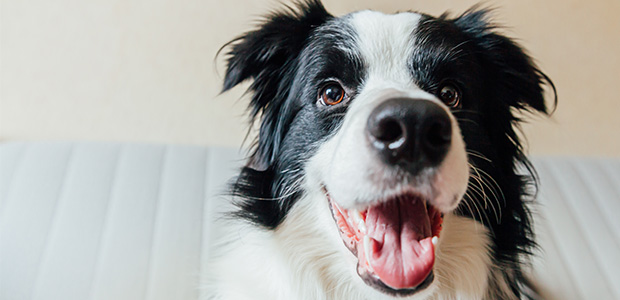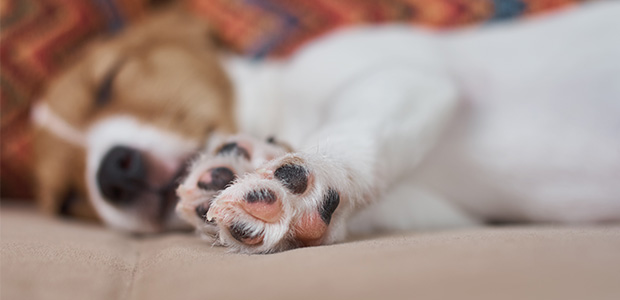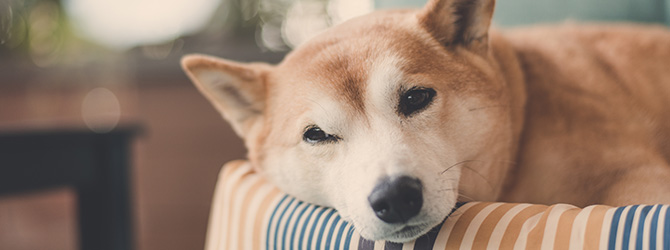Is your dog scared of thunder?
Noise phobias are common in dogs, especially if they’re not used to sudden loud noises.
Common signs of noise phobia include barking, jumping, trembling, restlessness and whining.
You can use sound therapy to get your dog used to thunderstorms and reduce their anxiety. When storms do occur, distractions such as loud music, games and stimulation can help to keep your dog calm.
Let’s take a closer look at how to reduce your dog’s anxiety during thunderstorms.
Why do dogs get scared of thunder and storms?
Loud noises are frightening for everyone. Humans know what thunder is and understand why storms occur, but dogs do not.
Just like loud, sudden fireworks on Bonfire Night, dogs find storms scary because they’re scary! In a dog’s mind, the noises are unpredictable and impossible to explain.
If a dog is carefully exposed to lots of different noises as a puppy (i.e. thunder and fireworks), they’re less likely to develop a noise phobia in later life.
Read more: Puppy socialisation & why puppy parties are so useful.
Signs of noise phobia
Signs of storm phobia include:
- Excessive panting and drooling
- Pacing restlessly around the house
- Trembling
- Hiding
- Destruction in the house (digging or scratching)
- Barking or whining (or both)
- Drinking more than usual
- A general change in demeanour
When you aim to calm your dog and reduce their anxiety, you can take both long-term and short-term measures.

Preparation - get your dog used to the sound of thunder
This method is formally known as sound therapy.
Play thunderstorm noises at home
Start out on a very low volume, do this when your dog is chilling, but not asleep. You’ll find a range of noise samples online, including thunder and lightning, fireworks and gun shots. Note: if your dog is scared of one of these sounds, they’ll likely be scared of all of them.
Act natural
As the sounds are playing, try to pretend nothing is happening. Keep an eye on your dog to make sure they’re fine with it.
Increase the volume
Do this gradually, over a number of days or even weeks, and only go higher if your dog acts completely normal around the noises.
Introduce a positive association
Once you can play the sounds loudly without your dog reacting, start the process again but this time, do something fun! Trying playing with your dog or offering treats. This will teach them not only to ignore the noises, but to associate them positively.
Sound therapy is often used to treat firework phobia in dogs, and is the only method that’s proven to be successful. The trick is to go slowly. Sound therapy may take months to complete, depending on your dog. Train in short, regular sessions – ideally during the spring or summer months when storms are less likely to occur.

Read more: Firework noises: prevent your dog’s anxiety using sound therapy.
What to do during a storm
Sadly, preparation and sound therapy take time and sometimes - especially with unpredictable British weather - time is a luxury you don’t have. In these situations, it’s better to focus on distracting your dog from the noises outside rather than getting them used to it.
Stay home with your dog
No harm will come from missing one walk - especially in dangerous weather. Your dog will appreciate you staying home with them during this turbulent time, especially if they’re prone to separation anxiety.
Create a safe space
Your dog might like to hide out somewhere they feel comfortable. This could be their favourite room in the house, their crate - or even something makeshift like a cardboard box.
Make sure your dog has a safe space readily available, and let them come and go as they please. In their fear and confusion, they might hide out alone one minute and be whining for your attention the next. This is fine - be there for your dog, but avoid making their anxiety worse by picking them up and smothering them. It’s okay to reassure them, but only if they seek it.
Use food to create a positive association
After the noise has gone off, reward your dog with a treat. By rewarding them after the noise goes off but before they’ve had time to react to it, you’ll help to introduce a positive association. That way when your dog hears thunder, they’ll think of food!
You could also provide your dog with a stuffed Kong toy to keep them occupied while they hide.
Distract your dog from the noise
Try playing music or turning up the TV - loud enough to drown out the thunder but not so loud that it scares your dog. Reggae, classical music and audiobooks have each been proven to help reduce dogs’ stress. When you go to sleep, try playing white noise sounds - you’ll easily find this on Youtube.
Keep your dog’s mind occupied too! If you’ve skipped your evening walk because of the bad weather, why not make up for it by playing some games with your dog?
Read more: How to keep your pet safe during stormy weather
Don’t punish or scold your dog
If your dog makes a mess, it’s important to remember that punishment doesn’t work. Shouting at your dog will actually make their fear and anxiety worse.
Focus on distracting them, keeping them busy, and on getting them used to loud noises so they’re anxiety isn’t such a problem in the future.
In severe cases, you may need the help of a qualified veterinary behaviourist. Your vet will be able to recommend a trusted behaviourist near you.

Need more info?
For further help and advice, have a chat with your local vet. Visit our Find a Vet page to locate your nearest practice or chat to a vet online, wherever you are, using Online Vets.

